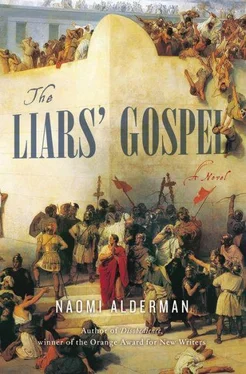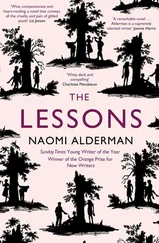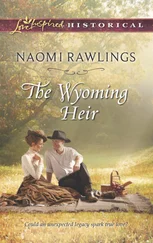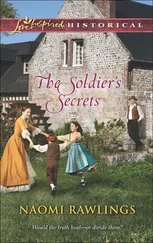“Tell more,” he says.
And she teaches him what she had learned when her parents took her to hear the great Rabbi Hillel speak, that our duty to love each other is the highest of all the commandments of God. That our duty of charity extends even to our own bodies, and we must care for them because our souls are guests in them.
He wants a mother, this boy, she can read it in the lines of him as he sits in the dust by her feet listening to her teach, until it is time for supper and the children come in bustling and hungry. He wants a mother to notice that he is there, and to teach him.
Later, Iov and Michal are sleeping and she tends the fire, banking it high so that it will burn slowly through the night. Gidon is still in the house, leaning his long, thin frame against the wall, whittling a wooden stick to a sharp point with his knife.
She says, “Who are your people?”
He says, “My family are those who believe what I believe.”
She has heard of such groups. The Essenes are one — they live together and follow the same customs although they are not kin — and there are other small groups, those who follow the same principles or who gather around a teacher.
“And where are they?” she says, because she thinks he will say that it is a group who live in the caves, or in the desert, or in the wooded hills near Jerusalem.
“We are scattered,” he says. “Now we who followed your son Yehoshuah are wandering. Teaching. We are spreading his words.”
She looks at him. He is leaning forward on his haunches now, observing her. He moves towards her. Not to touch, but closer to her body.
“Become one of us,” he says to her, softly. “Mother Miryam, listen to the teachings of your blessed son and tell us what you know of him. There must be stories”—his voice is low, so as not to wake the children, but he is speaking more quickly, with a dreadful urgency—“you can tell the holy stories of his birth, his childhood. No one sent me to ask this, but I had a dream. It was as the winter came on. In my dream, the clouds parted and a voice spoke from heaven telling me to find you. It said that I must come and help you and work with you, to learn the stories you could teach me.”
She is tired now. Not angry anymore, barely afraid. He’s a good worker and a kind lad, but she is tired.
“There are no stories,” she says.
He reaches out towards her.
“There are no stories. He was a baby and then he was a child and then he was a man and then he was killed. That is the story.”
“But,” he says, “what kind of baby was he? How was his birth? What manner of child? How did his great wisdom first show itself? And where did he get his learning?”
She sighs.
“Gidon,” she says, “you are a good boy. And you have no mother. Let me be a mother to you.”
He toys with his pointed stick, saying nothing.
“If I were your mother, I would tell you this: take a wife. I know you have only eight of your fingers, but there are many girls who would have you willingly.”
The daughter of Nechemiah for one, her mother has mentioned this to Miryam casually more than once now, has happened to ask if she knows whether Gidon has a wife somewhere.
“Learn a trade. You are skillful with your hands even still. Then take a wife. Fill her belly with sons and with daughters.”
He blushes a little at this, his face becomes bashful.
“Then you will think of your wife and your craft and your sons and your daughters, and forget that you came here for any other reason. That is a good life.”
But she sees from his face that this business is not over.
He had been, she admits it to herself now, a distant child. Not always distant. Often helpful, often sweet. But a child given to entertaining himself for hours. Yehoshuah could sit staring at the waving barley and when Yosef said, “What are you doing there, boy, sitting idle?” he would reply strangely, with an odd question, “Why did God make the locusts?” or simply say, “I am thinking, father.” But for all that, he seemed happy. He made friends easily. He had a way with him that was charming.
She remembers a small boy, Ze’ev, the child of Batchamsa from the village. Yehoshuah and Ze’ev played together, some game of catching a ball and counting the throws. They were eight or nine. Yehoshuah threw the ball too far, Ze’ev made a lunge for it and fell in the mud. It was funny. Miryam, half watching while sifting the dried lentils for stones, laughed. The boy was covered in mud, brown streaks over his clothes and in his hair. Yehoshuah didn’t laugh, he simply looked.
Later, when he was settling down to sleep, he asked her, “What did it mean, Ima, that Ze’ev fell down?”
“It didn’t mean anything, sweet. He just fell.”
“But what did it mean?”
He returned to this thought again and again. What did it mean that the rain fell? What did it mean that the dog died? As if the world were a book and each person and event in it had been carefully chosen, and their meanings could be understood if one only read aright.
She and Yosef argued about him.
“He’s always hanging around your skirts,” said Yosef, when he came in from his workshop and found Yehoshuah reading, or thinking, or whittling some wood by the fire when the other children were out playing in the orchards.
“He’s different to other boys,” said Miryam. “He doesn’t like their rough-and-tumble games.”
“You’re making him weak,” said Yosef. “You give in too easily.”
“Give in what? I should throw him out of the house and force him to play?”
“Yes! Or give him work! He’s nine, he’s old enough to work! Give him some of your jobs, working your fingers to the bone. Set him to chop the wood, or carry the water. If he wants to be a woman, let him pluck the goose!”
“A woman? He should be like you?” said Miryam, and this was the start of their troubles.
“Like me? What do you mean like me?”
“Like you, never studying anymore as you did when you were young, never going to learn with the rabbi.”
And so it went on. And Yehoshuah sat by the fire, and although he must have heard every word he said nothing, did nothing.
As he grew to adulthood she feared, for a time, that she had done something wrong. Her fears were only calmed when she saw that her younger sons were normal. Yirmiyahu was married at seventeen. Iehuda went to the wedding canopy at twenty. Shimon, the quiet one, developed such an ardent passion for a girl from the next village that no one could hold him back and the wedding was arranged when he was barely fifteen. But although they suggested girls to Yehoshuah, he would not meet them, and though they tried to persuade him, he did not hear their words.
As a young man, when he and Yosef could no longer be in the same home together, he began to travel. He stayed for a time among the Essenes, those men who live without women and refuse to defecate upon the Sabbath day. He took, for a year, more difficult vows. She had grandsons and granddaughters from her younger boys and the oldest was still unwed.
He came back home for a time when he was twenty-seven. Still no woman with him, though she had hoped that after his wandering he might return with a sweet bride and surprise them all with…what? With normality at last. But no. He was odder than ever, more distant and strange. He would not meet anyone’s gaze, seemed always to be staring at something just out of view. He and Yosef argued. When would he found a family of his own? Build a house? There was that far field, if he wanted he could build himself a place there, but he could not live with them anymore, it wasn’t right, a fully grown man living like a child, waited on hand and foot by his mother.
Читать дальше












